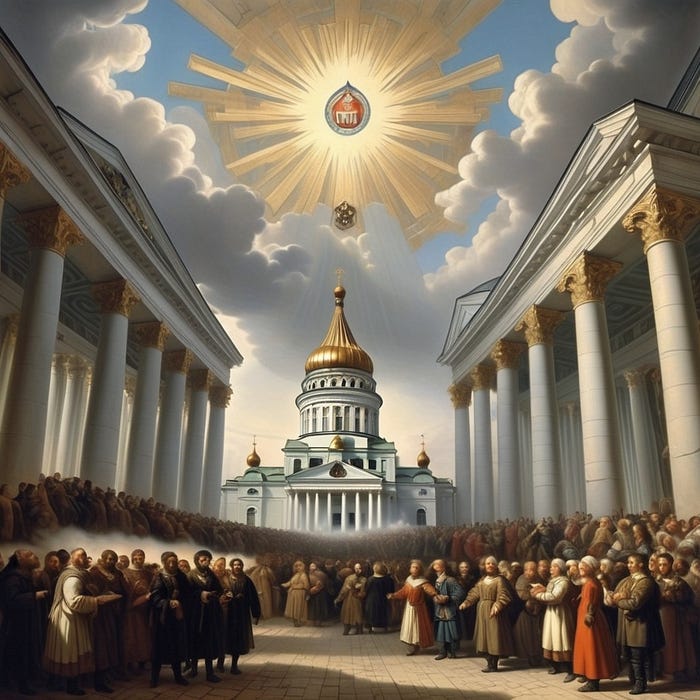My Correspondence with Alexandr Dugin on Lacan
I share one of the personal responses sent back to Alexandr Dugin on the topic of Lacan and “the father.”

“Dear Alexandr,
Yes, I believe that I follow your point. I wonder for how long I might be able to capture your attention with what it is that I’m going to write to you now.
Doesn’t Lacan do something that is mysterious and yet prophetic in his last teaching? It is clear: he has zero nostalgia for societies structured around the father. Goodbye fathers! The father, understood as the lynchpin of a social bond, never quite had the reach that anyone ever thought it did. This is why the truth of the father, in Lacan’s discourse theory, which you’ve cited in your work quite accurately, is the father’s castration: $. In other words, the father has a limit, or is limited by his reach.
Did we not also see this in Freud? There was always a zone foreclosed to the father’s law (i.e., the “navel” of the dream, and, at a later point, a side of the symptom, and so on). It is what made analysis interminable, in a way.
And so why shouldn’t we witness this also in geopolitics today? First, we saw the rogue state, and then the axis of evil, and finally, in an upsurge, the so-called evil empire. These are not my names — these are other names from the father, in a way. This place where the principle of the law, which would supposedly cohere our differences, erodes and the singular rises to the zenith as a dominant social principle. It is only on this basis that Huntington’s thesis can be sustained, in all of its incredible rigor and accuracy.
Okay, but can we go further still?
In the late teaching, Lacan says something else: one can do without the father. It is a multipolar vision, isn’t it? He moves from the “name of the father” — you do not have the Russian definite article, “the,” but I hope you can follow it anyway — toward the “names” of the father (plural). He says it plainly: “there are many names of the father.”
This was the beginning of his heresy to the church of the father. This is a nice word, heresy, because in French it sounds like “R-S-I,” the three orders of the Borromean knot, which you know quite well, but arranged properly, beginning with the Real. At this point, within the life of Lacan’s teaching, you do have something to catch onto with your multipolar vision. It is true — there are many names of the father, across civilizations and at whatever scale. It could be a woman, a religion, a cultural history, a cell phone, a drug, whatever. Why couldn’t the Russian truth be found also in the dark corners of Dostoyevsky, a father even for him — why not?
Except this is not how I read Dostoyevsky, personally. Nor one James Joyce, who also moved Lacan toward his final paradigm.
So, what is the final paradigm. Lacan says it clearly: “one can do without the father.” Heresy! I want to convince you to visit this paradigm of Lacan’s teaching. How does one do without the father? He begins with the seminar “… or worse,” which in French sounds the same as “father.” He says that when one gets rid of the father, he returns in the real, and often in a terrible way. Imagine the father returning in the look of Putin in Biden’s eyes. This is a return of the real, reflecting monstrosity back on oneself in the gaze of the Other. It says more about oneself rather than the other, doesn’t it? I think even Putin came around to this point of view, which I made long before him: “what Biden saw was his own soul reflected back at him.”
Thank you for following me this far in my argument. You get the sense that the father is something to be achieved, even if it is for each “one” and not for “all.” It is a question of singularity, and of how singularities, in the plural, can hold themselves together. These little snowflakes that now populate American campuses — how do they relate to those who are not snowflakes but maple leafs? One is a snowflake and another a maple leaf — how to relate? The multipolarity thesis hits a limit here. It is the limit of how to sustain oneself against the other’s mode of being or existence (forgive my lack of philosophical precision, being and existence … two different matters, even for Lacan).
In any case, at this point, nobody quite knows what to do: it is a question of threats to the singularity’s very existence. Suddenly, around the world, especially in the West, you see the Russian truth: my very existence is under threat from the Other. In the pure difference of civilizations, or social orders, how to get along with this? It is a question of how to live with the other’s unbearable existence. Sartre once said it correctly, but for the wrong reason: hell is other people. So the multipolar vision confronts limits.
I remind you of an old psychoanalytic joke:
A man goes to see his psychoanalyst and complains that he is a piece of corn.
‘Help me, Doctor, I believe I am a piece of corn and a giant chicken is trying to eat me!’
The man seeks analysis for three years and suddenly, he is cured. But then two months pass and he returns:
‘Doctor, help me, help me!’
The analyst replies: ‘but you are cured, you no longer believe yourself to be a piece of corn!’
The man replies: ‘I know that, idiot, but the chicken doesn’t know it!’
And so, are we not in this situation?: the empire of truth and the empire of lies, the latter not knowing that the piece of corn is not a piece of corn.
Duane”
